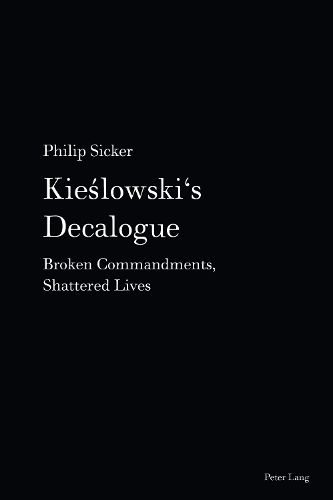Readings Newsletter
Become a Readings Member to make your shopping experience even easier.
Sign in or sign up for free!
You’re not far away from qualifying for FREE standard shipping within Australia
You’ve qualified for FREE standard shipping within Australia
The cart is loading…






This title is printed to order. This book may have been self-published. If so, we cannot guarantee the quality of the content. In the main most books will have gone through the editing process however some may not. We therefore suggest that you be aware of this before ordering this book. If in doubt check either the author or publisher’s details as we are unable to accept any returns unless they are faulty. Please contact us if you have any questions.
Written and produced under martial law in 1980's Communist Poland, Krzysztof Kieslowski's Decalogue presents a collective portrait of a demoralized nation populated by gloomy individualists" who respond to other people with antagonism or indifference. Feeling betrayed by a history of brutal invasions, the series' characters struggle to cast off a legacy of a bitterness that has arisen because their national hopes have been so frequently shattered. Yet the central questions that animate The Decalogue are not political but ethical and ontological: How should one live? And why should one live at all in an atomized civilization? In exploring these questions in relation to the Ten Commandments, the series' unifying principle is, paradoxically, disintegration: Kieslowski's protagonists break the Commandments in a fractured world drained of meaning. Disintegration functions as a multidimensional principle-moral, historical, social, and psychological-informing The Decalogue's conception, organization, and style. In analyzing these features the study draws on a wide range of philosophical, literary and psychoanalytic inter-texts.
$9.00 standard shipping within Australia
FREE standard shipping within Australia for orders over $100.00
Express & International shipping calculated at checkout
This title is printed to order. This book may have been self-published. If so, we cannot guarantee the quality of the content. In the main most books will have gone through the editing process however some may not. We therefore suggest that you be aware of this before ordering this book. If in doubt check either the author or publisher’s details as we are unable to accept any returns unless they are faulty. Please contact us if you have any questions.
Written and produced under martial law in 1980's Communist Poland, Krzysztof Kieslowski's Decalogue presents a collective portrait of a demoralized nation populated by gloomy individualists" who respond to other people with antagonism or indifference. Feeling betrayed by a history of brutal invasions, the series' characters struggle to cast off a legacy of a bitterness that has arisen because their national hopes have been so frequently shattered. Yet the central questions that animate The Decalogue are not political but ethical and ontological: How should one live? And why should one live at all in an atomized civilization? In exploring these questions in relation to the Ten Commandments, the series' unifying principle is, paradoxically, disintegration: Kieslowski's protagonists break the Commandments in a fractured world drained of meaning. Disintegration functions as a multidimensional principle-moral, historical, social, and psychological-informing The Decalogue's conception, organization, and style. In analyzing these features the study draws on a wide range of philosophical, literary and psychoanalytic inter-texts.